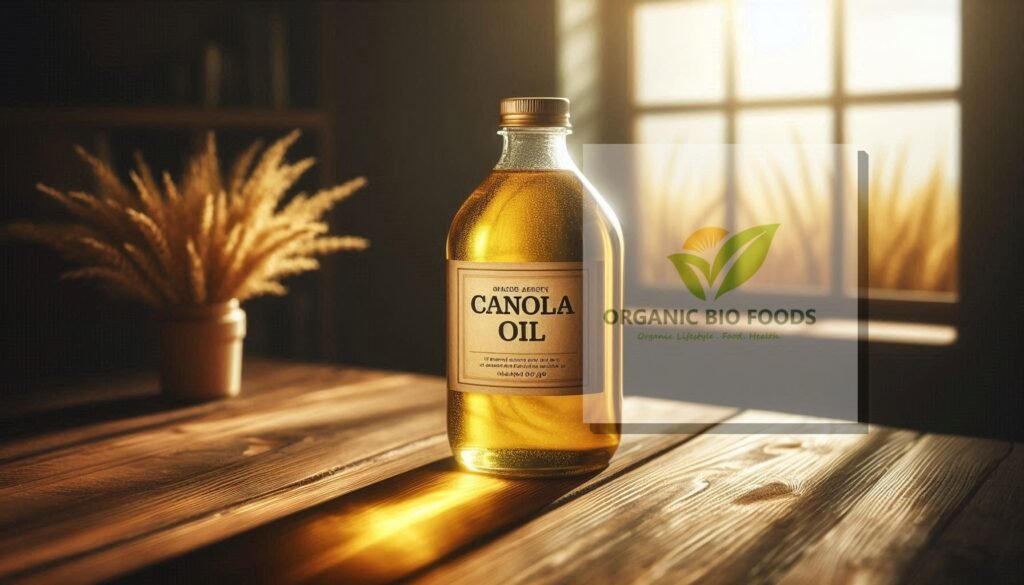زيت بذور اللفت، المعروف باسم زيت الكانولا في أنحاء كثيرة من العالم، هو من أكثر زيوت الطهي استخدامًا اليوم. يُروّج له كثيرًا لفوائده الصحية، وخاصةً دهونه المفيدة للقلب، ولكن له أيضًا بعض الجوانب السلبية التي يجب مراعاتها. إذا تساءلت يومًا عن سرّ شهرة هذا الزيت ومدى فائدته لصحتك، فستُفصّل هذه المقالة فوائده ومخاطره المحتملة.
ما هو زيت بذور اللفت/الكانولا؟
يُستخرج زيت بذور اللفت من بذور نبات اللفت، الذي ينتمي إلى فصيلة الخردل أو الكرنب (Brassicaceae). كان زيت بذور اللفت التقليدي يحتوي على مستويات عالية من حمض الإيروسيك، وهو ضار بصحة الإنسان. ومع ذلك، في سبعينيات القرن الماضي، استنبط علماء في كندا نوعًا جديدًا من نبات بذور اللفت يحتوي على نسبة منخفضة من حمض الإيروسيك، مما جعله أكثر أمانًا للاستهلاك. أُطلق على هذا النوع الجديد والأكثر أمانًا من الزيت اسم “كانولا”، وهو اختصار لعبارة “زيت كندي منخفض الحموضة”.
اليوم، يُكرّر زيت الكانولا بشكل كبير ويُستخدم على نطاق واسع في الطهي والخبز والقلي. ولكن، هل هو الخيار الأمثل لصحتك؟
الفوائد الصحية لزيت بذور اللفت (الكانولا)
غني بالدهون الصحية
من أهم فوائد زيت بذور اللفت الصحية احتوائه على دهون صحية، وتحديدًا دهون غير مشبعة. حوالي 62% من دهون زيت الكانولا هي دهون أحادية غير مشبعة، وحوالي 31% دهون متعددة غير مشبعة. تُعرف هذه الأنواع من الدهون بفوائدها الصحية للقلب، ويمكن أن تساعد في تقليل خطر الإصابة بأمراض القلب. وقد وجدت دراسة نشرتها جمعية القلب الأمريكية أن استبدال الدهون المشبعة (مثل الزبدة أو شحم الخنزير) بالدهون غير المشبعة، مثل تلك الموجودة في زيت الكانولا، يمكن أن يخفض مستويات الكوليسترول الضار LDL، مما يقلل من خطر الإصابة بأمراض القلب. الدهون الأحادية غير المشبعة – تساعد هذه الدهون على خفض مستويات الكوليسترول الضار LDL دون التأثير على الكوليسترول الجيد HDL. تناول المزيد من هذه الدهون، مثل تلك الموجودة في زيت بذور اللفت، يمكن أن يُحسّن صحة القلب. أحماض أوميغا 3 الدهنية – يُعد زيت الكانولا أيضًا مصدرًا جيدًا لأحماض أوميغا 3 الدهنية، وهي دهون أساسية لا يستطيع الجسم إنتاجها بمفرده. تُعرف أحماض أوميغا 3 بخصائصها المضادة للالتهابات، ويمكن أن تساعد في تقليل خطر الإصابة بالأمراض المزمنة مثل أمراض القلب والتهاب المفاصل.
نكهة محايدة ونقطة دخان عالية
من أسباب شيوع زيت بذور اللفت في المطابخ نكهته المحايدة. فعلى عكس زيت الزيتون، ذي الطعم القوي والمميز، يُمكن استخدام زيت الكانولا في مجموعة متنوعة من الأطباق دون تغيير نكهتها. وهذا يجعله خيارًا متعدد الاستخدامات للقلي والتحمير والخبز. بالإضافة إلى ذلك، يتميز زيت الكانولا بنقطة دخان عالية (حوالي 204 درجة مئوية)، مما يعني أنه يتحمل درجات حرارة الطهي العالية دون أن يتحلل. وهذا يجعله مثاليًا للقلي والقلي العميق، بالإضافة إلى طرق الطهي الأخرى التي تتطلب حرارة عالية.
قليل الدهون المشبعة
مقارنةً بزيوت الطهي الأخرى، يتميز زيت الكانولا بانخفاض نسبة الدهون المشبعة فيه. في الواقع، يحتوي زيت بذور اللفت على 7% فقط من الدهون المشبعة، وهي من أقل نسب الدهون المشبعة بين زيوت الطهي. وقد ارتبطت الأنظمة الغذائية الغنية بالدهون المشبعة بزيادة خطر الإصابة بأمراض القلب، لذا فإن استخدام زيوت مثل زيت الكانولا ذات محتوى أقل من الدهون المشبعة يمكن أن يساعد في الحفاظ على صحة قلبك. وتنصح المعاهد الوطنية للصحة (NIH) بتقليل تناول الدهون المشبعة للمساعدة في تقليل خطر الإصابة بأمراض القلب وغيرها من المشاكل الصحية. ويمكن أن يكون التحول إلى زيوت مثل زيت الكانولا، منخفضة الدهون المشبعة، إحدى طرق تحسين نظامك الغذائي.
مصدر لفيتامين هـ
يُعد زيت بذور اللفت مصدرًا جيدًا لفيتامين هـ، وهو مضاد للأكسدة يلعب دورًا حاسمًا في حماية خلاياك من الإجهاد التأكسدي. يساعد فيتامين هـ على تحييد الجذور الحرة، وهي جزيئات غير مستقرة يمكن أن تلحق الضرر بالخلايا وتساهم في الشيخوخة وأمراض مثل السرطان وأمراض القلب. ووفقًا لموقع Healthline، فإن الحصول على كمية كافية من فيتامين هـ من خلال أطعمة مثل زيت الكانولا يمكن أن يعزز صحة الجلد، ويعزز جهاز المناعة، ويقلل الالتهابات في الجسم.
سلبيات زيت بذور اللفت (الكانولا)
معالجة عالية
من أبرز الانتقادات الموجهة لزيت الكانولا خضوعه لعمليات معالجة عالية. خلال إنتاجه، يخضع زيت الكانولا لعمليات تكرير وتبييض وإزالة الروائح الكريهة ليصبح مناسبًا للطهي. ورغم أن هذه الخطوات ضرورية لإزالة الشوائب وجعل الزيت أكثر استقرارًا، إلا أنها قد تُفقده أيضًا بعض العناصر الغذائية، بما في ذلك مضادات الأكسدة الطبيعية والفيتامينات الموجودة فيه. بالإضافة إلى ذلك، يُستخرج معظم زيت الكانولا باستخدام مذيبات كيميائية مثل الهكسان، وهو منتج ثانوي للبترول، مما يثير مخاوف البعض بشأن احتمال وجود بقايا كيميائية في المنتج النهائي.
مخاوف الكائنات المعدلة وراثيًا
من سلبيات زيت الكانولا أيضًا أن معظم بذور اللفت المزروعة لإنتاج الزيت معدلة وراثيًا. في الواقع، حوالي 90% من محصول الكانولا في الولايات المتحدة وكندا مُعدّل وراثيًا ليكون مقاومًا لمبيدات الأعشاب مثل الغليفوسات. في حين أن إدارة الغذاء والدواء الأمريكية (FDA) والهيئات التنظيمية الأخرى تعتبر الأطعمة المعدلة وراثيًا آمنة، إلا أن بعض الناس يفضلون تجنبها لأسباب بيئية أو صحية. إذا كنت قلقًا بشأن الأطعمة المعدلة وراثيًا، فابحث عن زيت الكانولا العضوي أو غير المعدل وراثيًا.
نسبة أوميغا 6 إلى أوميغا 3
مع أن زيت الكانولا مصدر جيد لأحماض أوميغا 3 الدهنية، إلا أنه غني نسبيًا بأحماض أوميغا 6 الدهنية. كل من دهون أوميغا 3 وأوميغا 6 أساسية، لكن معظم الناس يستهلكون كميات كبيرة جدًا من أوميغا 6 ولا يحصلون على ما يكفي من أوميغا 3. يمكن أن يؤدي اتباع نظام غذائي غني بأحماض أوميغا 6 الدهنية مقارنةً بأوميغا 3 إلى زيادة الالتهاب في الجسم، وهو ما يرتبط بزيادة خطر الإصابة بأمراض مزمنة مثل أمراض القلب والسرطان. تنصح كلية هارفارد تي إتش تشان للصحة العامة بالحفاظ على تناول متوازن لأحماض أوميغا 3 وأوميغا 6 الدهنية لصحة مثالية. على الرغم من أن زيت الكانولا يحتوي على نسبة أفضل من أوميغا 6 إلى أوميغا 3 مقارنةً بالزيوت النباتية الأخرى، إلا أنه من المهم موازنة استهلاكك من الدهون من خلال تضمين المزيد من الأطعمة الغنية بأوميغا 3، مثل الأسماك وبذور الكتان وبذور الشيا، في نظامك الغذائي.
احتمالية احتوائه على الدهون المتحولة
قد تحتوي بعض زيوت الكانولا منخفضة الجودة على كميات صغيرة من الدهون المتحولة، وهي ضارة بالصحة. ترفع الدهون المتحولة مستويات الكوليسترول الضار (LDL) وتخفض مستويات الكوليسترول الجيد (HDL)، مما يزيد من خطر الإصابة بأمراض القلب. يمكن أن يحدث هذا أثناء عملية التكرير، خاصةً إذا كان الزيت مهدرجًا جزئيًا لزيادة مدة صلاحيته. لحسن الحظ، فإن معظم زيت الكانولا المباع في المتاجر اليوم ليس مهدرجًا، ولكن لا يزال من المهم التحقق من الملصقات للتأكد من خلو الزيت الذي تشتريه من الدهون المتحولة.
التأثير البيئي
أثار الإنتاج واسع النطاق لبذور اللفت لإنتاج زيت الكانولا مخاوف بيئية. تتطلب محاصيل بذور اللفت المعدلة وراثيًا استخدام مبيدات الأعشاب والمبيدات الحشرية، مما قد يساهم في تدهور البيئة ويؤثر على النظم البيئية المحيطة. بالإضافة إلى ذلك، تستهلك عملية تكرير ومعالجة زيت الكانولا كميات كبيرة من الطاقة والمياه، مما يدفع البعض لاختيار زيوت أكثر استدامة مثل زيت الزيتون أو زيت جوز الهند.
الخلاصة: هل زيت بذور اللفت (الكانولا) مناسب لك؟
لزيت بذور اللفت، أو زيت الكانولا، فوائد صحية لا شك فيها، خاصةً لمن يتطلعون إلى تقليل تناول الدهون المشبعة وزيادة الدهون الصحية للقلب في نظامهم الغذائي. فهو متعدد الاستخدامات، وبأسعار معقولة، ومصدر جيد للعناصر الغذائية الأساسية مثل فيتامين هـ وأحماض أوميغا 3 الدهنية. ومع ذلك، فإن طبيعة الزيت المعالجة بشكل كبير، واحتمالية احتوائه على مكونات معدلة وراثيًا، والمخاوف بشأن مستويات أوميغا 6، أمور تستحق النظر فيها.
إذا كنت تبحث عن زيت طهي بنكهة محايدة ونقطة دخان عالية، فإن زيت الكانولا خيار جيد. ومع ذلك، لتقليل المخاطر الصحية، اختر أنواعًا عالية الجودة، غير معدلة وراثيًا، أو عضوية. وكما هو الحال مع أي طعام، فإن الاعتدال هو الأساس – فموازنة استهلاكك من الدهون مع الزيوت والدهون الصحية الأخرى سيساعدك على الحفاظ على نظام غذائي متكامل ومغذي.








